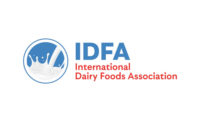IDFA: FDA’s proposed “healthy” rule falls short
FDA’s proposed “healthy” rule begins to embrace dairy, but many healthy dairy products are excluded.

Photo courtesy of stetiana via gettyimages.com

Low-fat cottage cheese. Flavored yogurt. Part-skim mozzarella cheese sticks. Reduced fat and whole milk. Americans have been turning to these products for generations as delicious and nutritious components of their well-balanced diets. Yet, under a new proposal from the U.S. Food and Drug Administration (FDA), none of these healthy dairy products can bear a “healthy” claim on their label.
At the time of the proposed rule’s release, the agency highlighted the fact that more than 80% of Americans are not eating enough fruits, vegetables, and dairy. Therefore, the intention with the proposed healthy rule was to align the use of the labeling claim with food categories recommended in the 2020-2025 Dietary Guidelines for Americans (DGAs). For the first time, the proposed healthy claim contains criteria specific to dairy products. To bear a “healthy” claim, a dairy product must contain the equivalent of at least a ¾ cup serving of dairy — a positive step toward encouraging consumption of dairy products. These are worthwhile goals that the dairy industry stands ready to support — when done correctly.
IDFA believes the FDA’s final rule must clearly establish criteria for dairy products that encourage the consumption of dairy foods while also helping consumers select the options that fit into an overall healthy diet. While the proposed rule takes some positive steps toward encouraging consumption of dairy products to help Americans meet the recommendations of the DGAs, it falls short in many other important areas by limiting the healthy claim without considering the full nutritional benefits of dairy to consumers.
More than five years ago, IDFA encouraged FDA to set criteria for a healthy claim specifically for the dairy category that took into consideration the full nutrient profile and dietary contributions of dairy. At the time, and still valid today, our argument was simple: The current regulatory definition for a healthy claim does not consider the unique nutrient contributions of a variety of dairy products, such as cheese, reduced-fat milk, and flavored yogurt.
Furthermore, the proposed rule ignores a fundamental tenant of nutrition guidance: A food must be consumed in order for it to have any nutritional and health benefit. And in fact, no other type of food or beverage provides the unique combination of 13 essential nutrients that milk and dairy contribute to the American diet, including high-quality protein, calcium, vitamin D, and potassium, along with health benefits including better bone health and a lowering of the risk for type 2 diabetes and cardiovascular disease.
Overwhelming nutrition and dietary science demonstrates that dairy is a crucial part of a healthy diet beginning at a very young age. Restricting or limiting dairy foods — which are severely under-consumed according to the federal government’s own DGAs and widely known to be nutritionally dense — flies in the face of nutrition guidance.
IDFA will be submitting formal comments to the FDA reinforcing these points before the comment deadline of December 28, 2022, and we encourage dairy advocates to support us. Now available on the IDFA Campaign Center is a tool that will allow you to submit comments on behalf of yourself or your organization to the FDA on the healthy proposed rule.
While healthy claims have the potential to support increased consumption of dairy products, it is also important that the federal government recognize the unique and essential role dairy products play in the healthy diets of Americans.
Looking for a reprint of this article?
From high-res PDFs to custom plaques, order your copy today!





